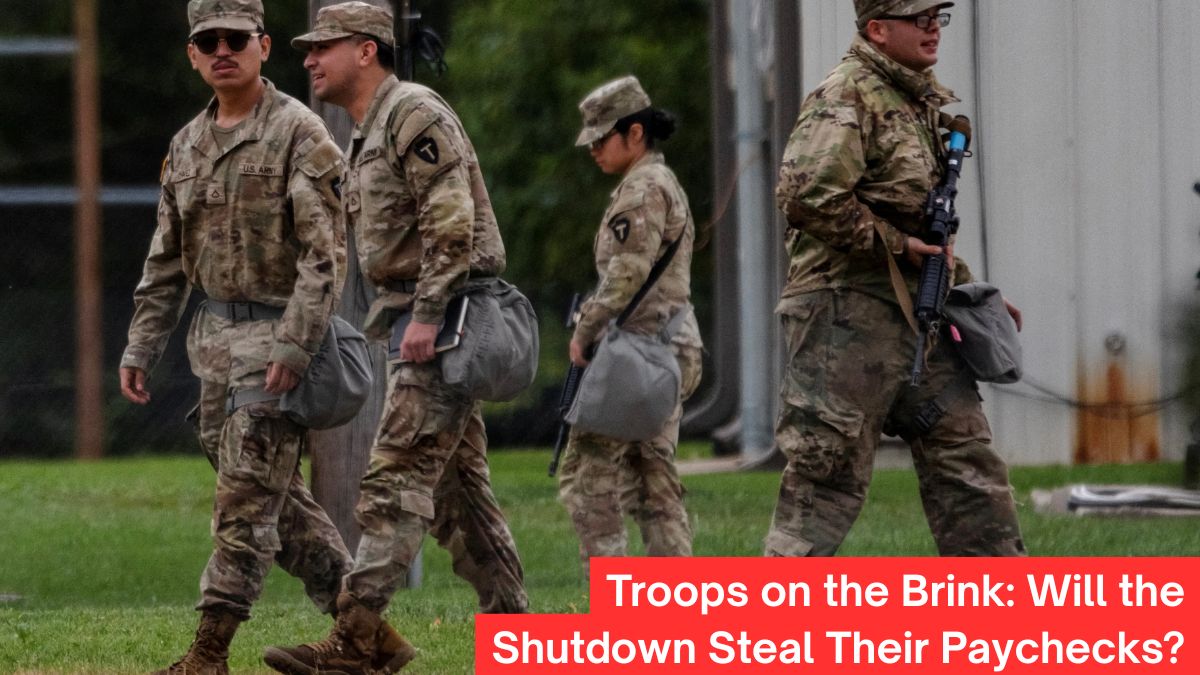What if your bank account was empty on October 15? That isn’t a scary story for the 1.3 million U.S. service members and their families. It’s a real risk as the government shutdown gets closer to its third week.
President Trump has made a bold move in the middle of a partisan deadlock: he has ordered billions to be moved from Pentagon research funds to pay for military pay.
But is that against the law? And how will it affect troops who are already stressed? Let’s take it apart.
Key Takeaways
- The October 15 payday may be the first in modern U.S. history missed by troops due to a shutdown.
- The White House plans to redirect $8 billion from unused Pentagon R&D accounts to cover pay.
- Opponents cite the Antideficiency Act, which bans unfunded spending without Congress.
- The 2025 military pay raise was 4.5 %, with extra boosts for junior ranks.
- A 3.8 % raise is proposed for 2026, though lower than recent increases.
The Shutdown Squeeze: Why Soldiers Are in Danger
Congress hasn’t passed a funding bill since September 30. Republicans want to cut programs like Medicaid, but Democrats won’t budge. The Senate is stuck in gridlock and needs 60 votes for a clean resolution.
The effect on troops is direct. Military pay could not be paid on time for the first time ever on October 15. No check means no groceries, no rent, and no medicine. On X (formerly Twitter), people are sharing stories about spouses going to food banks and families having trouble explaining empty fridges to their kids.
Since the shutdown started, the number of times “military pay” has been mentioned has tripled. Posts are unedited, harsh, and hopeless. A lot of people remind us that this isn’t politics for them; it’s survival.
Trump’s Change: A Plan to Save $8 Billion
On October 11, Trump said on Truth Social that he would tell Defense Secretary Hegseth to use “all available funds” to make sure the troops get paid. His plan is to use $8 billion in unspent research and development money from the last fiscal year.
Officials say they already know where the money is and are ready to go. Supporters say it’s strong leadership, while critics say it’s too much power.
Legal Risks and Backlash from Congress
The Antideficiency Act is the biggest problem. It says you can’t spend money without getting permission from Congress.
Office of Government Accountability
People who break the law can be fined or sent to jail.
There are a few narrow exceptions, like allowing things to happen in an emergency or to protect life, but they aren’t used very often.
The White House
Politicians are loud. Rep. Rosa DeLauro says the plan is clearly against the law. Republican veterans are worried. You could ask the Government Accountability Office (GAO) to step in.
The Coast Guard is also part of Homeland Security, not Defense, which makes things more complicated. This change in funds may not help it.
Voices Online: Rage, Hope, and Political Storms
X has a lot of volume. This is what’s hot right now:
- Blame Game (about 60%): Hashtags like #SchumerShutdown and attacks on both sides are the most common.
- Personal Stories: Memes making fun of inflation, complaints about having to re-enlist, and emotional pleas from military families.
- About 30% of the posts are positive, saying that the 5.2% raise in 2024 and the 4.5% raise in 2025, along with bonuses for junior troops, are good things.
As the deadline got closer, the chatter reached its peak on October 11, with more than 20 posts per hour. Hashtags like #PayOurTroops and #TroopsFirst show that people are coming together in the middle of all the chaos.
What’s Next: Pay raises, new laws, and fallout
Congress is looking ahead to a 3.8% raise in 2026, but that’s less than what they’ve done in the past.
This raise is backed by Trump’s budget.
The Pay Our Troops Act (H.R. 5401) would make sure that military pay continues during any shutdown.
The pressure is real for soldiers and their families. They’re not things you can trade. No matter what happens next, one thing is clear: pay our soldiers. Right now.
